By DANIEL KITTREDGE Like virtually all public settings across Rhode Island, the Cranston Public Library's various branches were forced to abruptly close last spring with the onset of the COVID-19 pandemic. It wasn't long, though, before the libraries
This item is available in full to subscribers.
We have recently launched a new and improved website. To continue reading, you will need to either log into your subscriber account, or purchase a new subscription.
If you are a current print subscriber, you can set up a free website account by clicking here.
Otherwise, click here to view your options for subscribing.
Please log in to continue |
|
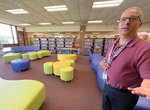
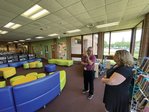
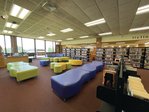
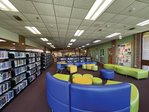
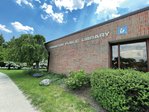
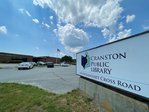
Like virtually all public settings across Rhode Island, the Cranston Public Library’s various branches were forced to abruptly close last spring with the onset of the COVID-19 pandemic.
It wasn’t long, though, before the libraries reopened, albeit on a limited basis. Through virtual programming, curbside pickup and other adaptations, the library system continued to connect residents and provide valuable services during an extraordinarily challenging time.
Now, in a most welcome development for patrons and staff alike, a nearly complete return to typical library operations is underway.
As Julie Holden, assistant director of the city’s libraries, puts it: “We’ve been open the whole time, except for the shutdown last spring. We were closed for 90 days exactly … It’s just the tables and chairs are out now, so that’s the big difference, and the meeting rooms are open again.”
Holden and Library Director Ed Garcia spoke with the Herald on Monday in an effort to get the word out to residents that the city’s libraries are fully back in business. It’s a process that ramped up quickly with Gov. Dan McKee’s move to lift most remaining COVID-19 restrictions on May 21.
“We didn’t think all the restrictions would be lifted as fast as they were,” Garcia said.
For the library system’s leaders, being able to welcome back visitors who wish to use the Central Library and the other branches for studying and reading has been perhaps the best part of the latest reopening push. Holden said during the course of the pandemic, the libraries fielded many requests from people who wished to spend time in the buildings.
“So many people wanted to be able to sit and read, or use a study table or whatever … That’s a huge thing,” Garcia agreed, adding: “It was so much fun as we walked out and saw people sitting, either sitting and chatting or studying at a table, reading a newspaper.”
There are other key changes of late. The various meeting rooms at Central and the other branches are now again available for public bookings. Garcia estimated that between 250 and 270 meetings and events are held in the library’s spaces each year, and “not being able to do that last year was really tough on people.” And Central is set to fully reopen its public computer access, extending the time limit from two to three hours and making all 24 computers available for use.
Mask-wearing, Garcia said, is not required for people who have been vaccinated, although a masking requirement remains for the children’s room at Central since vaccines have not been approved yet for children younger than 12.
The library system has adopted an “honor system” approach, Garcia said, given the logistical unfeasibility of performing checks. Staff, he said, have the option to continue wearing masks even if they are vaccinated.
“I don’t think it’s really been that much of a problem,” he said.
Some of the library’s adaptations from the pandemic will likely stick. Holden said some branches – Auburn in particular – continue to see demand for curbside pickup of materials, and she sees that trend continuing for at least the immediate future.
Outdoor programming, including a weekly storytime at William Hall Library and planned teen events at Central, will continue this summer, using pop-up canopies secured when it was anticipated that restrictions would be in place longer. Picnic tables will also be added on the lawn at Central to allow people to sit outside and use the library’s WiFi.
Virtual programming, too, will remain in some capacity. While most events, like the annual ArtsFest, will undoubtedly return to their in-person format, offerings such as book discussions with authors lend themselves well to the virtual format. Computer classes– which, paradoxically, had been difficult to hold during the pandemic for those who are not technologically savvy – are also set to resume.
“I’m not sure how much virtual programming we’ll do in the future, but I think we’ll still have some portion of that,” Garcia said. “I think that was something we learned we could do, and it was effective.”
Returning patrons will find some changes, particularly at Central and William Hall. At the former, a new teen room is “99.9 percent complete,” Garcia said, with new shelving and furniture that makes the space reconfigurable. William Hall, which has been undergoing renovations, is now almost totally complete, and its newly redone spaces like the program room, auditorium and children’s area, are set to welcome back visitors.
Has the library seen traffic pick up since the May lifting of restrictions?
“Oh god, yeah,” Holden said, later adding: “People just missed the space … people like coming here.”
For more information, follow Cranston Public Library on social media or visit www.cranstonlibrary.org.
Comments
No comments on this item Please log in to comment by clicking here